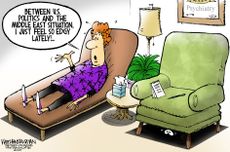Captives in our homes
In democracies the people get what they want. In America, we've always dreamed of owning a house—a 1,500-square-foot stake in the community. We demand roots—with a rec room. So over the past decade our government obligingly delivered a heady brew of monetary policy, tax breaks, and loan guarantees that made home-ownership look too attractive to pass up. Accordingly, subsidized Americans went on a giddy binge of sometimes irresponsible, sometimes outright fraudulent, house-buying. Home-ownership rates hit their all-time high—just shy of 70 percent—in late 2004. It was intoxicating for a few years there, but (as you may have noticed) it ended ugly.
Wall Street, up to its fat neckties in mortgage-based derivatives nobody ever understood, was thrown into total chaos by the housing bubble's blowout. With all the calm of a shrieking teen flinging garlic at a movie vampire, Washington heaved hundreds of billions of taxpayer dollars at failing financial firms. Economic growth screeched to a halt and reversed. The collapsing market value of bungalows and McMansions made Americans feel squeezed and tightfisted. Consumer spending plunged, sales plunged, profits plunged. And, predictably, unemployment soared.
And here we are. More than one hundred thousand Americans have just lost their jobs. According to psychologists who study happiness, that is the most miserable experience many people will ever endure. Getting back to work is the best medicine. For thousands of workers and their families, getting back to work means packing up and heading to a new gig in a new town. But many will find it difficult even to consider a move. Because it's tough to sell a house you could never really afford in a town now bleeding jobs.
Subscribe to The Week
Escape your echo chamber. Get the facts behind the news, plus analysis from multiple perspectives.

Sign up for The Week's Free Newsletters
From our morning news briefing to a weekly Good News Newsletter, get the best of The Week delivered directly to your inbox.
From our morning news briefing to a weekly Good News Newsletter, get the best of The Week delivered directly to your inbox.
Government-subsidized borrowing gave us the housing bubble, precipitated financial Armageddon, helped prompt recession and mass unemployment. But, as the infomercials say, that's not all! By zealously pushing home-ownership, federal housing policy has pinned to the map many now-jobless Americans who otherwise would have moved to find new work. A recent National Bureau of Economic Research study by economists Fernando Ferreira, Joseph Gyourko, and Joseph Tracy found that homeowners with low or negative equity are much less likely than average to pick up and move. For reasons both financial (moving is expensive and everything's sunk in the house) and psychological (people hate selling at a loss) these homeowners often feel "locked in." As unemployment rises, lock-in can leave laid-off workers gasping for air, drawing out the anguish of unemployment and deepening the downturn.
Our economy will eventually revive when capital begins to find its way again to economically productive projects. That means credit markets need to thaw and resume matching investors to sound investments. But it also means that so-called "human capital"—the effort, talent, and skill of workers—needs to find its most fruitful uses. That's best for each of us, as individual wage-earners, and best for the economy and society as a whole. The skills of an out-of-work machinist in Ypsilanti might be worth a tidy sum in Omaha. But that fact can't help him, or the rest of us, if he's locked in place by his two-and-a-half bath piece of the American Dream.
Successful economies adjust swiftly and dynamically to new information. Simply put, if we want to stay a rich country, we've got to learn from our mistakes. In the end, politics and public policy reflect the broader culture. The national craving for a room or ten of our own is the bottom-line cause of the housing policies that pushed us past the brink of disaster. If we're willing to learn, if we're going to adjust to our hard-won knowledge, we'll get rid of home-ownership subsidies altogether. If we want to mitigate the damage done, the federal government should follow Harvard economist Edward Glaeser's advice and bring clarity and simplicity to mortgage renegotiation and foreclosure rules, and give some cash to those evicted to help them move on. But, more importantly, we should pause to reflect on our culture's eagerness to own. We should pause to consider the irony of our situation: we subsidized roots and brought upon ourselves a brutal, withering drought.
Sign up for Today's Best Articles in your inbox
A free daily email with the biggest news stories of the day – and the best features from TheWeek.com
Create an account with the same email registered to your subscription to unlock access.
-
 'A direct, protracted war with Israel is not something Iran is equipped to fight'
'A direct, protracted war with Israel is not something Iran is equipped to fight'Instant Opinion Opinion, comment and editorials of the day
By Harold Maass, The Week US Published
-
 Today's political cartoons - April 17, 2024
Today's political cartoons - April 17, 2024Cartoons Wednesday's cartoons - political anxiety, jury sorting hat, and more
By The Week US Published
-
 Arid Gulf states hit with year's worth of rain
Arid Gulf states hit with year's worth of rainSpeed Read The historic flooding in Dubai is tied to climate change
By Peter Weber, The Week US Published
-
Issue of the week: Yahoo’s ban on working from home
feature There’s a “painful irony” in Yahoo’s decision to make all its employees come to the office to work.
By The Week Staff Last updated
-
Issue of the week: Another big airline merger
feature The merger of American Airlines and US Airways will be the fourth between major U.S. airlines in five years.
By The Week Staff Last updated
-
Issue of the week: Feds’ fraud suit against S&P
feature The Justice Department charged S&P with defrauding investors by issuing mortgage security ratings it knew to be misleading.
By The Week Staff Last updated
-
Issue of the week: Why investors are worried about Apple
feature Some investors worry that the company lacks the “passion and innovation that made it so extraordinary for so long.”
By The Week Staff Last updated
-
Issue of the week: Does Google play fair?
feature The Federal Trade Commission cleared Google of accusations that it skews search results to its favor.
By The Week Staff Last updated
-
Issue of the week: The Fed targets unemployment
feature By making public its desire to lower unemployment, the Fed hopes to inspire investors “to behave in ways that help bring that about.”
By The Week Staff Last updated
-
Issue of the week: Is Apple coming home?
feature Apple's CEO said the company would spend $100 million next year to produce a Mac model in the U.S.
By The Week Staff Last updated
-
Issue of the week: Gunning for a hedge fund mogul
feature The feds are finally closing in on legendary hedge fund boss Steven Cohen.
By The Week Staff Last updated